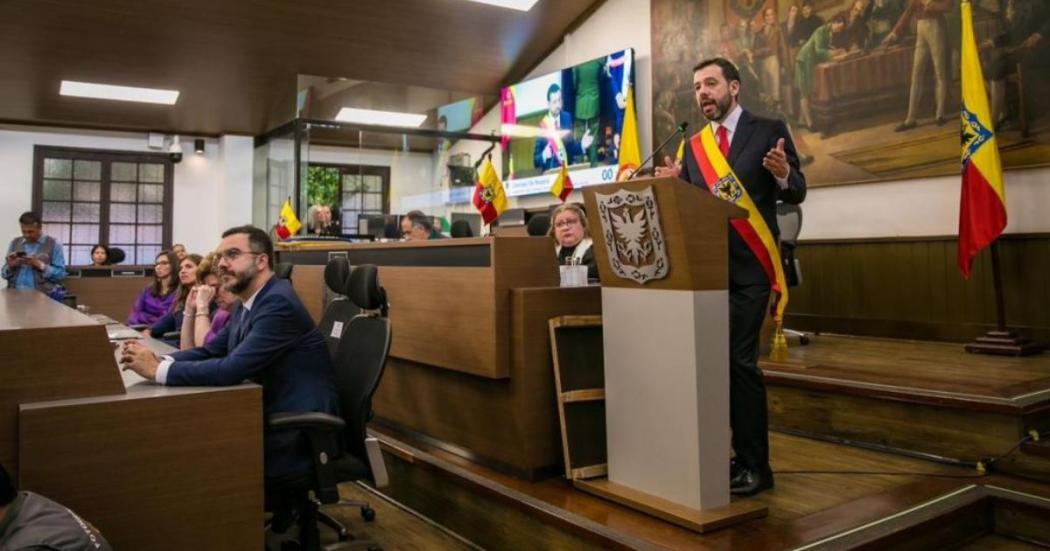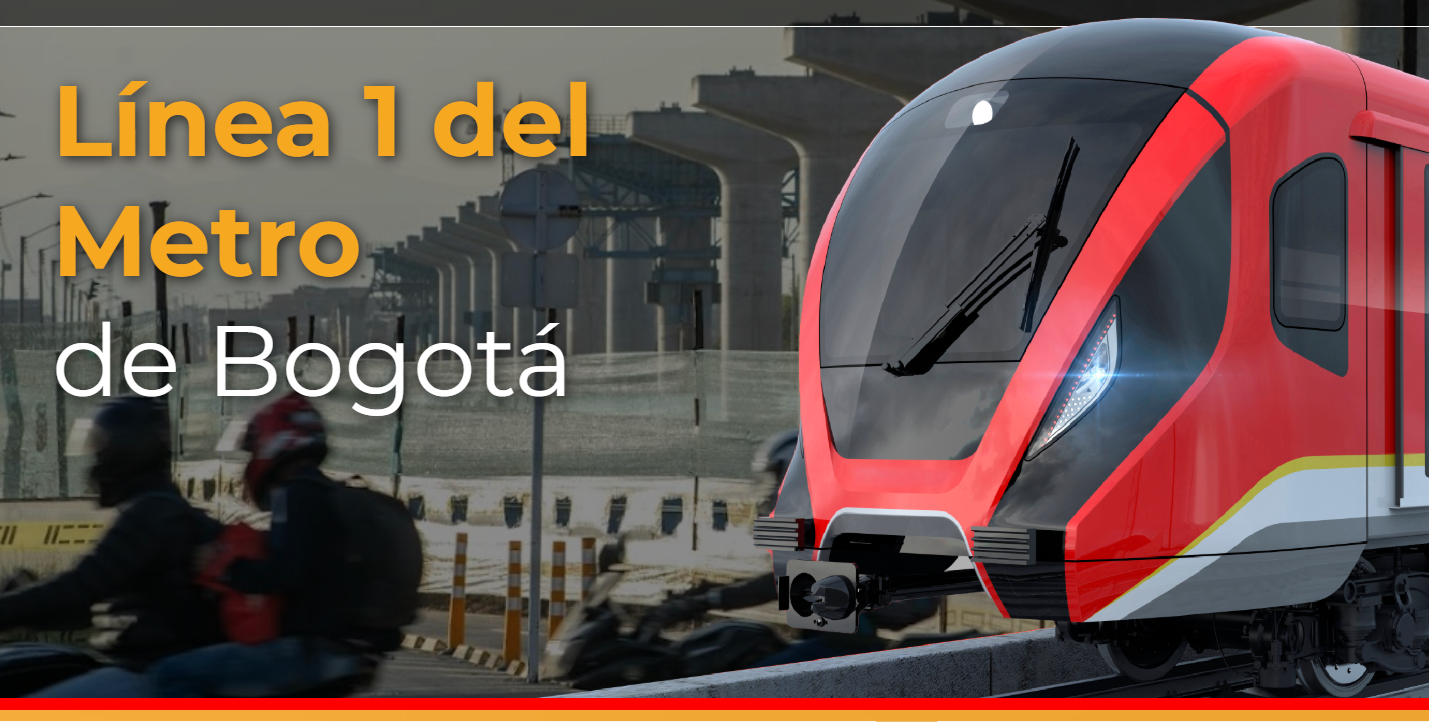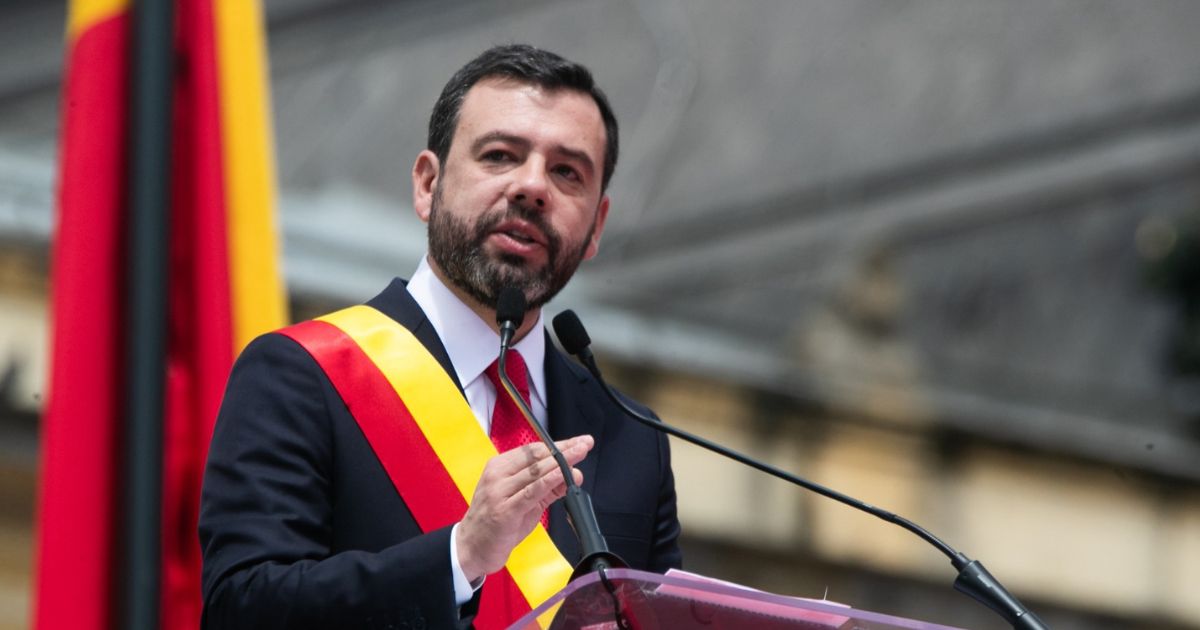This is Mayor Carlos Fernando Galan's speech at the inauguration of the Bogota City Council for the 2024-2027 term.
Good afternoon, everyone. A warm greeting to the President of the Council, Dr. Edward Arias, to the board, to all 45 council members of Bogota, to the members of the Council's team, to the Council Secretary, to the entire sound team, and to all the officials present here in this Bogota City Council.
A very special greeting to the members of the Cabinet who are joining us here, the incoming Cabinet. Greetings to all the friends who are here, former council members of Bogota. This feels like coming to my own home. That's how I feel about this Council. You know that I began my political career here nearly sixteen years ago as a council member in 2008.
This is the third inauguration of sessions I have attended, but it's the first one I'm doing as the Mayor of the city. I am well acquainted with this body. I am aware of the fundamental importance that the Bogota City Council holds in the debate about the city's future.
This is a body that knows Bogota like no one else, that understands and connects with the concerns and aspirations of its citizens like no one else, due to the diversity represented in the Council, due to the voices present here, precisely representing a diverse, rich, critical city that demands.
So, for me, it will be very important, based on that knowledge, to work with you. I remember very well a few years ago when we, together with those who are now taking their seats again, faced that pandemic and the uncertainty it generated. We came here to approve a development plan in May 2020, in the midst of a full-blown pandemic. Quarantines, some wearing glasses, masks, and all sorts of face coverings. That was a demonstration that this body functions, works, and fulfills its duty. It was the first body in Colombia to exercise political control and oversight over an executive authority in the midst of the pandemic.
You know that a situation like the one we experienced is exceptional, involving the restriction of individual freedoms. There was a lockdown; people couldn't go out, and making such decisions was allowed, obviously within the framework of public health decisions. But precisely in those moments, it is more important for a body that exercises oversight and control to function, and it did. This is just one example of many moments when this body has demonstrated its dedication to the city.
So, I want to start with that and tell you that being here is very special to me as the mayor. I also believe, and I was told this during a campaign debate by Diego Molano, the candidate I also competed against. He said that to be the mayor of Bogota, there should be a requirement to have been a council member of Bogota because the knowledge that comes from managing the city, sitting here as you all are, is truly exceptional. The public may not really know this, but everything is debated here every day.
I believe it's more than 250 sessions per year, we go beyond that. All topics, absolutely all topics, with a rigor, knowledge, study, and support that I believe no other public body in Colombia has. That is very valuable, and I think it's a part of the strong institutional framework that Bogota has, and we must defend it.
This is a platform for understanding the city, for study, and obviously for overseeing the work of the city government. Here, in this forum of Bogota's democracy, is the highest administrative authority in Bogota. We recognize this in our administration, and that's how we're going to work with you.
That's why the members of the new cabinet are here, who have the commitment and motivation to come to the Council to debate, discuss, present, respond to, and address the concerns that this body will have within the framework of the debates that will take place over the next four years.
These debates have some key, fundamental elements that you know better than anyone: the discussion of the development plan, the discussion of the budget, and other projects that we hope to present in this Council, with the goal of modernizing the public administration of Bogota.
Edward Arias, in his speech, mentioned some topics I want to address. One is that you all experienced it during the just-concluded campaign, and that is that the citizens are going through a difficult and concerning moment due to the security situation. We are aware that this is a priority for the administration, and we also believe that this body must respond. It's not easy, we have to admit that, but we have to coordinate, we have to create the tools, and we have to work with the different actors who play a crucial role in security, to act and act swiftly, to change the focus of security policy, a focus that is primarily aimed, and this translates into budget, resources, and decisions, at confronting the criminal gangs operating in Bogota.
You know it very well. The increase in the percentage of homicides carried out by hitmen is a clear demonstration that there is a confrontation between criminal gangs operating here, seeking to control illegal markets.
This requires a different strategy. It's not just about law enforcement efforts on the city's streets at the time crimes occur. It requires intelligence to determine who is behind these organizations, how they operate, how they are financed, and how they use the resources obtained from the illegal market. We will go after the entire criminal apparatus they represent. That will be our primary focus.
Understanding that there are criminal dynamics here that Bogota had not truly experienced before. They were different. This, obviously, requires technology, coordination with national policy, and demanding much more support for Bogota in terms of law enforcement, which we are progressing towards.
The newly appointed Metropolitan Police Commander, who starts his duties tomorrow, has been given the specific instruction to work on strengthening the police force. One of the key elements that General Salamanca mentioned to me is that we will gradually see an increase in law enforcement presence in Bogota, a force that must be trained precisely for the emphasis I mentioned earlier.
Certainly, but also trained, of course, in human rights. This is a city that must have a strong, decisive security policy that guarantees human rights. That must be the commitment.
A second point that I find important to mention, and you all know this better than I do, I don't know how many debates you can estimate take place here each year regarding public works. I want to invite you all to sit down and rethink how we do construction projects in Bogota. How much frustration you receive from the citizens when they traverse the streets and neighborhoods of Bogota due to issues with construction projects taking much longer than budgeted and costing much more.
Projects start, and it becomes apparent that the studies were incorrect, outdated, they have to wait for input from another entity, there's a lack of communication between entities, time passes, and the citizens become desperate. There are shop owners, small businesses in the neighborhoods, who initially believe that a project will improve the road. They say, "We have six months," but when eight, ten, or twelve months pass, they go out of business.
The social impact of public works in Colombia has not been adequately calculated, it's not taken into account. In some countries, when a project is initiated, the project budget includes consideration of the social impact it will have on different stakeholders due to the opportunity cost of having a road under construction.
So, we have serious issues. The Urban Development Institute (IDU) has problems, and we all know it. I want to invite you all to work with the administration to review how construction projects are carried out in Bogota. Let's rethink this so that they are genuinely effective, and we can know with certainty when a project starts and when it will finish. This will be a fundamental element for Bogota to regain trust in its government and administration. And I believe that includes the City Council. It involves all of us.
I want to work towards achieving a real change in the city's construction projects. I was informed about this during the transition. And no, I'm not saying it's a particular responsibility of this administration. It's an institutional problem that has persisted for many years and has not been resolved.
But you all are aware, and I imagine that you have had recent debates here about, for example, what's happening with 68th Avenue BRT trunk and some specific sections that are experiencing serious delays. Projects that are costing much more, requiring extensions and additions. Right now, there are extensions defined in some cases that require resources that haven't been budgeted for yet; we need to secure them. There's a significant challenge there.
So, I do want to propose to this Council today that we work on rethinking the way Bogota does things, from contracting to financing and project execution and oversight. This will help us build a better city.
Connected to this, I'd like to talk about mobility. I think it was clear in the electoral process. Bogota wants to make progress on projects and wants them to materialize, be completed, and have a public transportation system that guarantees the ability for everyone to move around. Those with fewer resources face more difficulties and higher costs due to the lack of a public transportation system that the city still doesn't have.
So, I want to work with this Council to figure out how we can improve the transportation system. Continue, of course, with the ongoing projects, monitor them to ensure completion, provide continuity, and leave behind the "Starting from Scratch Syndrome" Understand that when there are major projects in progress, they must continue and be completed; they are projects for the city, not just one administration or another. That's what people are expecting.
But we also have the challenge in the transportation system that has been discussed in many debates, and many of you have discussed it during the campaign, which is the deficit in the public transportation system, a headache for this city.
You know this, and you approved the budget, more than three trillion pesos, which includes what the city receives from user validations in the system and the cost of operation. There, we have to rethink it without a doubt, and I want to mention that this was one of the topics I discussed in a meeting with the President of the Republic—how we work to find sources of financing for the operation of the public transportation system.
We have to find them, but we must ensure a system that is affordable for citizens. Because the more we keep increasing fares, being responsible to secure the resources needed to guarantee the operation of the system, we are also pushing many people away from public transportation. For someone who earns much less than the minimum wage, as is the case for many in Bogota, paying a high fare for public transportation is unfeasible.
We need to find resources, sources, discuss them. This will be a scenario that I want us to discuss within the administration, among many others.
There are legal frameworks in place. There are already national regulations that have explored the possibility of alternative sources for funding the operation of public transportation systems. Let's sit down and think about them so that the system can continue to function, operate, improve service quality, but also so that citizens can afford it because today, as I mentioned in many cases, they cannot.
This is a city that has also made significant progress, I must say, in some areas that I acknowledged during the electoral process. I want to mention one initially, which is the Care System, and in this case, it was approved by this Council as a policy of the city, not of one government. Obviously, it is the result of the outgoing administration of Mayor Claudia Lopez, but it now belongs to the city.
It's a very important project that, in a way, addresses an injustice in our society, which is not recognizing the caregiving work performed by over a million women in Bogota without receiving a single peso for their labor. So, working to strengthen, expand, and take the Care System to a new stage will be one of the priorities of our administration, and I am convinced that the Council is committed to advancing in this as well.
Another important topic is education. I want to say, and I know there is a valid discussion with some political sectors, which we will have, but one thing concerns me greatly, and it's that we relied on a project that I found positive, a significant step forward that allows over 40,000 young people to access university education, but it's financed with debt.
If we want to continue a project like that, if we want to ensure that more and more young people have the opportunity to study at the university, how are we going to finance it? We don't have resources beyond what's already allocated in the future budget, and even those are subject to potential court decisions. We need to work on financing the city's educational system and the transition to higher education, both technical and technological.
This leads me to briefly discuss another topic, which is the city's finances. You are also very familiar with this. Bogota's level of debt is currently at a level it has never seen before or had experienced previously.
I believe that debt is a source of resources that a city can use to address many of its needs, undoubtedly. Perhaps Bogota had underutilized this source of funding, that's true. But what is also true is that the level of debt we currently have reduces our ability to access new debt to invest and finance new projects further. Financial flexibility is reduced, and this presents a challenge for the administration.
On one hand, this challenge involves fiscal austerity, and a commitment to it. The city cannot continue multiplying service provision contracts indefinitely each year; that needs to be reviewed, and that's just one example. It cannot continue investing in things that do not genuinely reflect a direct impact on people's quality of life. I am aware that the administration must provide information and have communication policies, but these policies should not be about self-promotion. They should be about working with citizens, engaging them, and ensuring that citizens play an important role in policy execution to make them effective. For me, that will be very important, ensuring that any resources spent on communication are precisely for that purpose: getting citizens to play a significant role.
This work will be one of the spending priorities, among many other things. However, we have a fiscal situation that you know is not easy, and the upcoming year will be challenging. Projections in terms of construction in Bogota, for example, indicate a decline of over 60%, and some council members here are well aware of that, in terms of sales and new licenses.
This will have a delayed impact because the employment consequences of the construction decline do not happen immediately. We currently have construction projects underway that were licensed and sold previously. So, the impact on employment occurs later, and in the coming year and the year after that, we will face more significant challenges in terms of employment, particularly in the construction sector.
In response to the construction decline, we need to take action. I am already working with my team to design a reactivation plan with a particular and primary focus on housing. We aim to inject resources into a sector that undoubtedly has one of the most substantial impacts on the economy, employment, and even the city's income.
We need to work on this reactivation plan, making it broader, of course, so that it has the desired impact and helps mitigate the reduction in employment that we will likely witness due to the national and local economic situation.
Another topic that I must acknowledge is that the outgoing administration, under Mayor Claudia Lopez, quickly managed, with the support of this Council, to design tools that allowed us to provide resources to vulnerable individuals during the pandemic. This achievement has been recognized nationally and internationally. Bogota found a way to complement the national efforts effectively, and this had a positive impact on our ability to address poverty during the challenging times of the pandemic.
Today, we are in a worse situation than when the pandemic began. However, if we hadn't taken those measures, we would be facing a much more critical situation. So, we want to continue, strengthen, and enter a new phase in addressing this issue. We understand that it has been effective but also requires tools to better harness the benefits of urban agglomeration.
A city can generate dynamics of contact, development, and interaction that we must take advantage of to advance a social policy that not only includes support through direct, unconditional subsidies to citizens in need but also outlines a roadmap for these individuals to lift themselves out of vulnerability and start generating income.
This is crucial for a person's dignity—to feel that they can, after receiving assistance during a difficult time, move forward and improve their situation. We want to work on policies that are effective in this regard.
I don't want to extend this much longer, but I want to let you know that, from my side, as the council members here know, who were my colleagues, you will have the doors of the mayor's office and the administration open to you. There will be ongoing dialogue. We are open to dialogue, collective construction, and criticism, which is necessary, healthy, and serves to determine when things are not going well. The control exercised by all the council's factions serves precisely for that, for the administration to make corrections when necessary.
This constructive control that helps detect flaws will be a very positive tool for our administration. Our team, which is present here, is aware of that and is ready to work in a respectful manner, ensuring that the Council can exercise its function and potentially help us make better decisions. So, I want to congratulate you and say that we are entering four challenging but exciting years for everyone— for the administration, for you as council members, and for me as mayor. I am convinced that due to the qualities of the team sitting here and the qualities of the council members present here, we will be able to have a dialogue that will greatly benefit this city.
I believe it will allow us to dream again of a city, to become excited about Bogota once more, to feel that love and excitement for what this city means to each one of us. It's a diverse, rich city that is strong precisely because of that diversity. And that will lead us to a new chapter in Bogota's history. Congratulations and thank you all.
Here is the broadcast of Mayor Carlos Fernando Galan's speech at the installation of the Bogota City Council for the 2024-2027 period:






